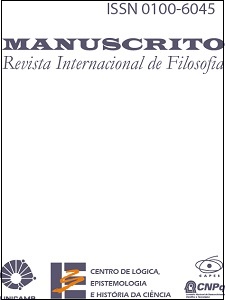Resumen
In this paper I study the variants of the notion of completeness Husserl presented in “Ideen I” and two lectures he gave in Göttingen in 1901. Introduced primarily in connection with the problem of imaginary numbers, this notion found eventually a place in the answer Husserl provided for the philosophically more important problem of the logico-epistemological foundation of formal knowledge in science. I also try to explain why Husserl said that there was an evident correlation between his and Hilbert’s notion of completeness introduced in connection with the axiomatisation of geometry and the theory of real numbers when, as many commentators have already observed, these two notions are independent. I show in this paper that if a system of axioms is complete in Husserl’s sense, then its formal domain, the manifold of formal objects it determines, does not admit any extension. This is precisely the idea behind Hilbert’s notion of completeness in question. Therefore, the correlation Husserl noted indeed exists. But, in order to see it, we must consider the formal domain determined by a formal theory, not its models.
Citas
BACHELARD, S. (1968; 1957). A Study of Husserl’s Formal and Transcendental Logic. (Evanston, Northwestern University Press).
CAVAILLÈS, J. (1997; 1947). Sur la logique et la théorie de la science. (Paris, Vrin).
DA SILVA, J. J. (1999). “Husserl’s Conception of Logic”, Manuscrito XX(2), 367-397.
———. (2000). “Husserl’s Two Notions of Completeness”, Synthese (forthcoming). HUSSERL, E. (1970). Husserliana, vol. XII. (The Hague, Martinus Nijhoff).
———. (1970; 1900-01). Logical Investigations. (New York, Humanities
Press).
———. (1972; 1913). Ideas – General Introduction to Pure Phenomenology. (New York, Collier-Macmillan).
SEBESTIK, J. (1997). “Postface”, in Cavaillès, Sur la logique et la théorie
de la science. (Paris, Vrin), pp.91-142.

